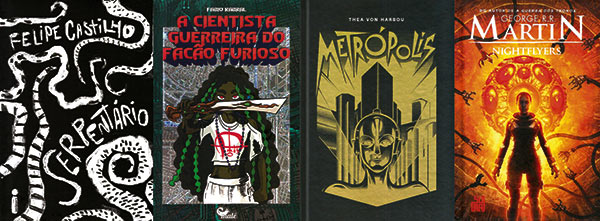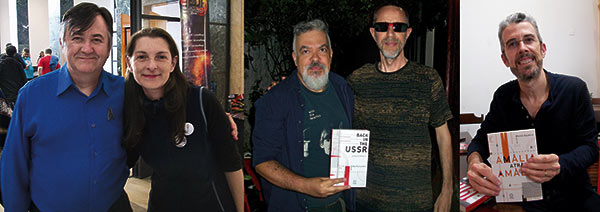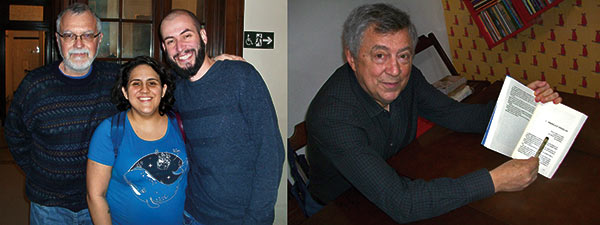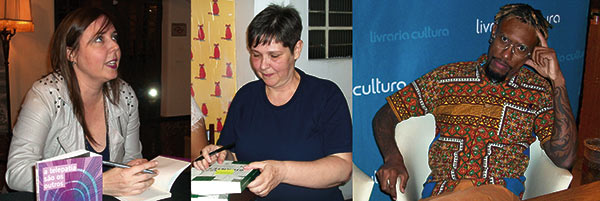SF in Brazil, by Roberto Causo

These are dire times for Brazil’s book market and publishing industry, with the current political and economic crisis extended under the unsympathetic-toward-culture Bolsonaro administration. In 2018, important book chains Saraiva and Cultura filed for the local equivalent of US Chapter 11. Measures included closing up bookstores; firing staff, clerks and booksellers; and withholding payments for publishing houses and other suppliers. In 2019, Saraiva revised its reorganization plan before court.
In response to that state of affairs, small bookstore chains stepped up to fill in the gaps left by the big ones as they stumbled. Blooks and Travessa expanded their operations to other states than their original home ground, Rio de Janeiro. Small- to medium-size publishing houses directed their efforts to small events and internet-based operations.
The important book company Aleph turned to the republication of classic novels already in its catalog, including Isaac Asimov’s The Caves of Steel, The Unveiled Sun, and Robots of Dawn, with new covers presenting Stephen Youll artworks from 1990s original US editions. Aleph’s only translation of a recent book published in 2019 so far is John Scalzi’s The Last Colony. Investing in the cult market, the company also brought for the first time to Brazil a translation direct from the German of Thea von Harbou’s tie-in novel of Fritz Lang’s Metropolis, in a beautiful hardcover edition. Petê Rissatti is the translator.
One of the most interesting 2019 developments are the science fiction book lines or “collections” centered on Brazilian writers, beginning with Nelson de Oliveira’s Futuro Infinito (Infinite Future) for Editora Patuá, of São Paulo. Titles include Fábio Fernandes’s Back in the USSR, Braulio Tavares’s Fanfic, Claudia Dugim’s Matador de Gigantes (Giant Killer), Marco Aqueiva’s Amália atrás de Amália (Amália after Amália), and a book by Ivan Carlos Regina – Brazil’s edgiest experimental SF writer. Regina’s book is an omnibus with his O Fruto Maduro da Civilização (The Ripe Fruit of Civilization; 1993) and O Éter Inconsútil (The Unsubstantial Ether) in one volume (with inverted texts and covers like an old Ace Double) gathering his whole production in the SF field. All Futuro Infinito books have cover design by Teo Adorno. The line combines veterans and relative newcomers, men and women, with a strong inclination toward experimental prose. Fernandes’s novel is a post-modernist alternate history romp starring John Lennon. Tavares’s book is the fifth story collection by one of our best short story writers. Dugim’s novel is a more straightforward narrative set on a generation starship, with a transsexual person as the hero. Aquiva’s novella is a dystopian/cyberpunk story with smooth literary prose, his first venture in science fiction.
Another collection with a strong literary bent is Monomito Editorial’s Universo Insólito (Uncanny Universe), whose first title, Ana Rüsche’s SF novella A Telepatia São os Outros (Telepathy Are the Others) appeared in 2019. Written with a surefooted literary, delicate touch, it imagines a traditional Andean beverage that induces telepathy, which puts it in the sights of a US big pharma mogul. Rüsche coordinates the collection with publisher Toni Mendes. As I write this, no second title has been announced.
A third book collection announced in 2019 is Duda Falcão’s Multiverso Pulp (Pulp Multiverse) of original anthologies approaching the pulp aesthetics of adventure and strong narrative pace, to be released through AVEC Editora, founded in 2014 by Artur Vecchi in Porto Alegre, in the Brazilian South. The first anthology will gather sword & sorcery stories and the second one, space opera stories. The third and final one will be dedicated to pulp horror. This set of books derives almost directly from the Sagas series of original anthologies that Falcão and Cesar Alcázar produced in their now closed-down publishing house Argonautas, about five or six years ago.
According to Falcão, “the aim of Multiverso Pulp, when I suggested the collection to Artur Vecchi, was to publish genre fiction following some examples taken from American pulp magazines. I do believe that the more the Brazilian authors handle the rules present in those genres, the best we’ll be able to employ their ingredients to build unique stories with their own identities. It’s no coincidence the Americans dominate the market for fantastic literature. They have developed it first, with the popular magazines and fan engagement…. We need to accomplish a similar strategy here in Brazil.”
After the strong professionalization of the past few years, it seems that the field is going back to what it was from 2008 to 2015, when the small press ruled the scene. In any case, books by Brazilian authors keep appearing: Fábio Kabral is in a good moment with his Afrofuturist novels, and 2019 saw A Cientista Guerreira do Facão Furioso (The Warrior Scientist of the Furious Machete) out through Malê, following his O Caçador Cibernético da Rua 13 (13th Street Cybernetic Hunter) in 2017. Nikkelen Witter released her steampunk novel Viajantes do Abismo (Travelers of the Abyss) through AVEC Editora, and Enéias Tavares had his Juca Pirama: Marcado para Morrer (Juca Pirama: Set to Die), another steampunk novel, published by Jambô, a role-playing game company that has released interesting stuff in the fantasy field, such as R.A. Salvatore’s Dark Elf novels and Brazilian Leonel Caldela’s 2018 novel A Flecha de Fogo (Flame Arrow). Tavares’s book has a great cover art by Henrique DND. Both companies are based in Porto Alegre, in the Brazilian South.
Still outside SF, bestselling author Felipe Castilho released his first venture into horror fiction, Serpentário (Snake Pit), through Intrínseca. Ana Cristina Rodrigues launched her fantasy novel Atlas Ageográfico de Lugares Imaginádos (The Nongeographic Atlas of Imaginary Places) through Lendari, and Carol Schiovatto published through AVEC her first novel of YA urban fantasy, Porém Bruxa (Witch Though). Schiovato’s novel, along with Ana Rüsche’s novella, were treated by André Cáceres, of major newspaper O Estado de S. Paulo, as examples of urban fantasy that look Brazilian current issues in the eye.

TRANSLATION OF RECENT BOOKS STILL MOVING ON
While Brazilian authors are still kept away from the main publishing world of SF, fans celebrate a batch of translated works that attest the recent new status of science fiction in the book market.
George R.R. Martin went from LeYa to Suma (part of the Cia das Letras editorial group) and all his Song of Ice and Fire novels were republished with new cover art by French artist Marc Simonetti, quite popular in Brazil. Martin’s Locus Award winner Nightflyers also appeared through Suma in a beautiful hardcover edition with David Palumbo’s full-color inner illustrations and fine cover art by Brazilian Julio Zartos. Recently, Suma has re-launched Martin’s Wild Cards anthology series.
Morro Branco publishing house keeps up its fine SF line with the release, in a short span, of Octavia E. Butler’s Dawn and Adulthood Rites (of the Xenogenesis series), plus Parable of the Sower and Parable of the Talents, and Ursula K. Le Guin’s The Lathe of Heaven. Now it has surprised the field by publishing for the first time in Brazil Samuel R. Delaney’s classic novel Babel 17. Morro Branco is the Brazilian publisher of N.K. Jemisin, Charlie Jane Anders, Sara Holland, and Seanan McGuire.
Planeta, a bigger company, is stepping up the publication of science fiction through its imprint Minotauro Brasil with Kim Stanley Robinson’s Locus-recommended New York 2140, and with John Joseph Adams’s Wastelands: Stories of the Apocalypse, an anthology featuring a major roster of contributors. There seems to be a trend in there around global warming and ecocatastrophe. Minotauro also published Madeline Miller’s fantasy novel Circe. The imprint announces itself as collection “dedicated to speculative fiction” – an expression that a few years ago was absent from Brazilian dictionaries, let alone the book market.
Finally, Margaret Atwood’s award-winning dystopia The Testaments, released in November through Rocco, of Rio de Janeiro, merited a huge marketing campaign and lot of reviews and mentions at the mainstream press, making a big splash and debuting at the PublishNews bestselling list in one week.
THE BRAZILIAN SFF STRANGE HORIZONS EDITION
Ecocatastrophe indeed. At the presentation of the Strange Horizons edition (September 30, 2019) dedicated to Brazilian stories, art editor Dante Luiz, a Brazilian, pointed out that “The year of 2019 was difficult for the entire planet, and for Brazil especially so. We have seen political persecution, the rise of the far right, and political chaos. The Amazon is still burning, but artists keep creating in spite of it.” Stories by Isa Prospero, Heitor Zen, Sérgio Motta, H. Pueyo, and Kali de los Santos accordingly present characters living under degraded, desperate circumstances of social and racial oppression. Poems by Brazilian-American Woody Dismukes, an interview with artist Juliana Pinho, and an overview of Brazilian SFF’s current state written by Jana Bianchi, editor of local internet magazine Mafagafo, complete this historical special edition, the first one dedicated to Brazil by an English-language magazine. Yet, as I write this, Mato Grosso’s Pantanal, the biggest swamp area in the world, is also burning and a mysterious oil spill taints beaches, marshes, and coral banks on Brazil’s beautiful shores….
THE OUTER LIMITS
Journalist Felipe Laurence, of EstadaoQR, a technology site associated to newspaper O Estado de S. Paulo, put together in July an assemblage of stories by “seven established writers” who were to answer the following question: “How do Brazilian science fiction authors believe the future will be?” The seven futurist stories explore the issue of automation and its supposed dehumanizing aspects, and are accompanied by podcast versions read by a digital voice heard in popular apps around the country. Authors were Cláudia Fusco, Roberto Causo, Ursulla Mackenzie, Gerson Lodi-Ribeiro, Ana Rüsche, Ana Cristina Rodrigues, and Luiz Bras.

HOT BRAZILIAN AWARD SEASON
For a long stretch, the Argos Awards, given by the Brazilian Science Fiction Reader’s Club (a fan club and not a book club), was the only annual award in Brazil. Now a couple of others are claiming the attention of fans and professionals: the Le Blanc Awards, directed toward pop culture and sponsored by the Communication School at Federal University of Rio de Janeiro, and the Fantastic Literature Odyssey Awards, delivered at an event of the same name in the Brazilian South.
The Argos results for 2019 were: Novel: A Mão que Pune: 1890 (The Hand that Punishes), Octavio Aragão. Anthology or Collection: Fractais Tropicais, Nelson de Oliveira, ed. Short Story: “Sombras no Coração” (Shadows in the Heart), Marcelo Augusto Galvão.
The II Le Blanc Award results of interest were: Novel: Auto da Maga Josefa (Witch Josefa’s Spoof), Paola Lima Siviero. Anthology: Fractais Tropicais, Nelson de Oliveira, ed. Translated novel: Dawn, Octavia E. Butler. Translated anthology: The Book of Swords, Gardner Dozois, ed.
The Fantastic Literature Odyssey 2019 Awards results were: Long Narrative for Young Readers: Orlando e o Escudo da Coragem (Orlando and the Courage Shield), Ana Lúcia Merege. Long Narrative, Horror: Nihil, Carolina Mancini. Short Narrative, Horror: “Madres”, Isabor Quintiere. Long Narrative, Science Fiction: Corrosão (Corrosion), Ricardo Labuto Gondim. Short Narrative, Science Fiction: “A Invasão dos Macacos” (The Invasion of the Apes), Saulo Adami. Long Narrative, Fantasy: O Auto da Maga Josefa, Paola Siviero. Short Narrative, Fantasy: “Oceano Sorvete de Uva” (Grape Ice Cream Ocean), Gabriel Cianeto.
Two authors came out of the race as freshly certified names to follow and appreciate: Paola Siviero with her heroic fantasy novel, and Marcelo Augusto Galvão with his short story. Galvão’s story also won the short fiction award of the Brazilian association of writers of crime fiction, suspense, and horror for horror short fiction. He told us: “Winning two awards and being nominated for another with the same Lovecraftian short story in a year – definitely, it was something I didn’t expect at all. It shows that, despite all the obstacles, the Brazilian market has been growing with each passing year. To me, it means my efforts as a writer are being rewarded, especially when my work is acknowledged by my peers.”
Siviero’s publishing house, Dame Blanche, works exclusively with ebooks and is directed by Anna Martino & Clara Madrigano. “Dame Blanche was founded in 2016 with the goal of publishing shorter work in the speculative genre,” they told me. “We always dreamt of publishing stuff we would like to read – and we wouldn’t find it easily because there was no interest from publishing companies to invest in the fantasy and SF niche beyond international bestsellers.” About Siviero’s novel they said: “It is our most successful book at this point, mostly by the combination of some interesting aspects: it is a fantasy story with Brazilian elements, but it avoids by a great distance any caricature and doesn’t employ any of the tired approaches in dealing with [the culture] of the Brazilian Northeast.” Siviero’s novel deals with a witch who battles demons alongside her male sidekick in the Northeast’s physical and cultural landscape.

THE PLACE OF “THE FANTASTIC” IN BRAZILIAN LITERATURE
Nothing of the above seem to impress mainstream writer Santiago Nazarian, himself a writer of praised postmodernist horror books such as A Morte sem Nome (Nameless Death), Mastigando Humanos: Um Romance Psicodélico (Chewing Humans: A Psychedelic Novel), and Neve Negra (Black Snow), and who knows something of the local speculative fiction community from panels in fan events such as Fantasticon in São Paulo. On September 29, 2019, he published at major newspaper Folha de S. Paulo an article answering a question posed by himself: Why fantastic literature doesn’t take off in Brazil. His answer is a recasting of the elitist literature argument that commercial fiction isn’t cut out to last and to be significant. The argument presumes that mainstream legitimate fiction has in itself those redeeming characteristics. If popular fiction can’t mimic values, approaches and proceedings employed by the mainstream, it can’t be significant and will always be shallow. Of course, what he is championing is the status of mainstream fiction, meaning that any of his previous commitment to genre is just part of postmodernist appropriation that would grant him a place within high literature. This is also a well-known tactic used by writers who see themselves as authors for the ages, to detach themselves from what is perceived as a tainted relationship with popular, lowbrow literature. SF authors Samir Machado de Machado (who also writes postmodernist speculative fiction), Aline Valek, and Diego Guerra produced responses, along with academic Bruno Anselmi Matangrano, but Nazarian remains adamant: the fantastic may be undergoing a good moment in the market, but it will never belong to Brazilian literature. On November 11, in his blog, he wrote another piece under the title “Burying Brazilian Fantastic Literature” and closing in with the statement: “Brazilian fantastic literature will not last!”
–Roberto Causo
This report and more like it in the January 2020 issue of Locus.
 While you are here, please take a moment to support Locus with a one-time or recurring donation. We rely on reader donations to keep the magazine and site going, and would like to keep the site paywall free, but WE NEED YOUR FINANCIAL SUPPORT to continue quality coverage of the science fiction and fantasy field.
While you are here, please take a moment to support Locus with a one-time or recurring donation. We rely on reader donations to keep the magazine and site going, and would like to keep the site paywall free, but WE NEED YOUR FINANCIAL SUPPORT to continue quality coverage of the science fiction and fantasy field.






